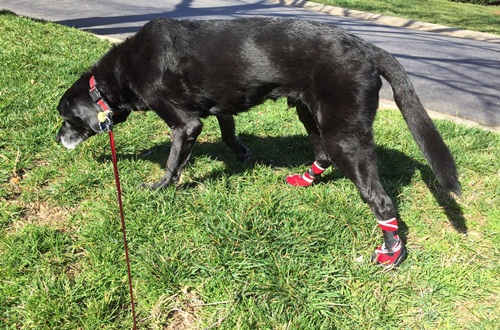DOG FOOD ALLERGY SYMPTOMS AND
TREATMENT
POSTED BY JACKIE
06 JUNE 2017 |
Dog Food Allergy Symptoms and Treatment
Question on Dog Food Allergy Symptoms
Hello Dr Becker,
I have a 4 year old pit bull mix that has had chronic diarrhea since early July. She’s had tests for pretty much everything, all negative. She has been on metronidazole and tylan power since early July. She was wormed (Panacor) in August. The only test we have not done is the endoscopy/colonoscopy which we declined to do because a switch to Iams low residue food seemed to get the diarrhea under control. I had been weaning her off the antibiotics and had her down to 1 metronidazole every 2 days and very tiny amounts of tylan at each meal. That lasted 1 month. About 2 weeks ago she developed vomiting, diarrhea and hives along with the leakage of approximately 50mls of blood from her anus. After rushing her to the vet she was diagnosed as having an acute allergic reaction, thought to be caused perhaps by swallowing an insect. She was given an anti-nausea shot and started on benadry 50mg 2x/day and famotidine 2x/day alternating the drugs every 6 hours for a week. Following this she had firmer stools on her reguluar diet but some burping up of food and leakage (she didn’t seem to be aware or it) of fecal matter with blood, small amounts every day. Six days after the first visit to the vet I came home from work after 6 hours and she had hives all over her body again and diarrhea and more burping up of food. I was told to increase the benadryl dose slightly and give it every 8 hours and continue with the famotidine and switch her to hydroxyzine every 8 hours and start her back on the metronidazole and tylan at full strength. Part of the symptoms were waking up between 2-3 every morning having to defecate and then straining every 1/2 hour or so for 3 or 4 hours with a very “gurgly” tummy. I noticed a few days ago that she seemed to break out in hives 20 minutes after eating breakfast, so I again called the vet who noted it was “interesting” and called the internal vet specialist we had seen who said that he had never seen a dog allergic to the low residue food get hives. I switched her to a bland diet of potatoes and chick peas (completly novel for her) and she has had no hives, no tummy gurgling and hasn’t woken me up at night. She is still on the medications, metronidazole BID, Tylan BID, Hydroxyzine TID, Famotidine BID and Forti Flora QD. I am wondering if I am possibly right that the diet could be causing all these issues? The Iams food is terrible, it has chicken, corn, grits (whatever they are) as the first 3 ingredients, plus fish meal and loads of other stuff. I am thinking of switching her to Natural Balance LID venison and sweet potato. Any information you can provide would be most welcome and I apologize for this terribly long email.
Patti
Dog Food Allergies Treatment
Hi Patti,
Boy this sure sounds like food allergies. I saw this hive reaction years ago in a dachshund every time she got into the cat food. The owner had to put the cat food up on a table to keep the dog out of it. I wouldn’t change the diet if she is doing well on what she is on. One thing that happens in situations like this is that when the gut is inflamed this badly the food she is eating-the proteins and other molecules that normally wouldn’t pass into the blood stream can due to the “leaky gut”. This then kicks in the immune system as these shouldn’t be there and the immune system’s job is to remove foreign particles as well as bacteria, viruses etc…. So, a pet on a hypoallergenic diet can do well for awhile and then destablize as they now have become allergic to the food they are on.
One caution is that allergies can happen to any drug and she is on a number of drugs. Also, the Forti Flora has proteins in it-beef last I knew, so she is being exposed to that as well as the restricted diet.
I don’t recommend you take her off anything, but you might consult with your vet or a vet that does complementary medicine such as acupuncture, homeopathy and other modalities to see if you can wean her off some of this or maybe get a hypoallergenic probiotic. Though switching anything could destablize her and would need to be done with extreme caution and slowly except food if she develops a allergic response to the diet she is on currently.
There is a list of Complementary Veterinarians here: American Holistic Veterinary Medical Association. Acupuncture has shown great promise for allergic diseases as well as many others. Often, these complementary practices can alleviate the need for so many drugs or even fully stablize a patient.
As stress does play a large part in disease and the bodies electromagnetic field is disrupted by any disease process doing things to realign this field helps. You can also do the following techniques at home yourself with a cooperative patient to get the bodies energies flowing better and the spiritual being (yes animals are spiritual beings too) back in communication with the body so it can heal better. You can learn these simple techniques and even take a free on-line course here Learn to Alleviate Illnesses and Injuries.

